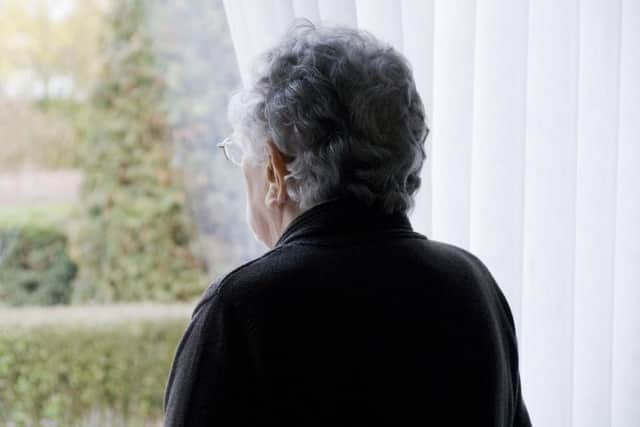When do over-70s have to reduce social contact? Latest advice for elderly people in Scotland during coronavirus pandemic
Elderly people in the UK will not be forced to self isolate for up to four months, the Scottish Government has announced.
The UK now has more than 3,200 confirmed cases of coronavirus confirmed prompting the UK government to propose self isolation measures for the most vulnerable - particularly those aged 70 and over.
Will elderly people in Scotland have to self isolate?


Advertisement
Hide AdAdvertisement
Hide AdThe Scottish government is not planning to isolate those aged 70 and over due to coronavirus fears, the Scottish Health Secretary has said.
Jane Freeman, Health Secretary in Scotland, said the government would instead be asking the elderly to reduce social contact.
While the plan to force over-70s to stay at home for up to four months was described as a “very big ask” by UK Health Secretary Matt Hancock, the measure is intended for their own “self-protection”.
However, Scotland has opted to not to take such a stringent approach and is recommending the elderly reduce their social contact instead, as they are one of the most vulnerable groups at risk of contracting the virus.
What is the advice to elderly people in the rest of the UK?
On Tuesday 17 March, Prime Minister Boris Johnson announced that anyone aged 70 and over in the UK must self-isolate at home from this weekend (21 March) for up to four months to prevent them from contracting the virus.
In a briefing on Tuesday (17 Mar), Boris Johnson said: “In a few days’ time - by this coming weekend - it will be necessary to go further and to ensure that those with the most serious health conditions are largely shielded from social contact for around 12 weeks.
“This avoiding all social contact is especially important for the over 70, pregnant women and those with health conditions.
“It is now clear that the peak of the epidemic is coming faster in some parts of the country than others.
Advertisement
Hide AdAdvertisement
Hide Ad“People over 70 might feel there is something excessive about these measures. I believe they are overwhelmingly worth it to slow the spread of the disease, reduce the peak, save life, minimise suffering and give our NHS the chance to cope.”
What measures should the over 70s take?
The World Health Organisation (WHO) has said that self isolation is currently “the most effective way” of preventing the potentially deadly virus from spreading.
Those aged 70 and over are urged to remain in the home and avoid public areas, except if they need to receive medical care.
People are advised to ask for help if they require any shopping or medications, and should call ahead before visiting a doctor.
It is also advised that those who are self isolating should separate themselves from others in their home if possible, and stay in a well-ventilated room with a window to the outside that can be opened.
The elderly are more at risk of coronavirus due to having a weaker immune system, meaning their bodies are less able to fight the virus off.
Coronavirus: the facts
What is coronavirus?
COVID-19 is a respiratory illness that can affect lungs and airways. It is caused by a virus called coronavirus.
What caused coronavirus?
The outbreak started in Wuhan in China in December 2019 and it is thought that the virus, like others of its kind, has come from animals.
How is it spread?
Advertisement
Hide AdAdvertisement
Hide AdAs this is such a new illness, experts still aren’t sure how it is spread. But similar viruses are spread in cough droplets. Therefore covering your nose and mouth when sneezing and coughing, and disposing of used tissues straight away is advised. Viruses like coronavirus cannot live outside the body for very long.
What are the symptoms?
The NHS states that the symptoms are: a dry cough, high temperature and shortness of breath - but these symptoms do not necessarily mean you have the illness. Look out for flu-like symptoms, such as aches and pains, nasal congestion, runny nose and a sore throat. It’s important to remember that some people may become infected but won’t develop any symptoms or feel unwell.
What precautions can be taken?
Washing your hands with soap and water thoroughly. The NHS also advises to cover your mouth and nose with a tissue or your sleeve (not your hands) when you cough or sneeze; put used tissues in the bin immediately and try to avoid close contact with people who are unwell. Also avoiding touching eyes, nose and mouth unless your hands are clean.
Should I avoid public places?
Most people who feel well can continue to go to work, school and public places and should only stay at home and self isolate if advised by a medical professional or the coronavirus service.
What should I do if I feel unwell?
Don’t go to your GP but instead call NHS 111 or look online at the coronavirus service that can tell you if you need medical help and what to do next.
When to call NHS 111
NHS 111 should be used if you feel unwell with coronavirus symptoms, have been in a country with a high risk of coronavirus in the last 14 days or if you have been in close contact with someone with the virus.
Sources: World Health Organisation and NHS